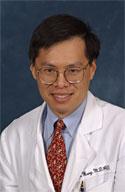Biography
Michael M. Wang, MD PhD, is an assistant professor of neurology and director of molecular stroke research in the Department of Neurology at the University of Michigan. He also is an assistant professor of molecular and integrative physiology at the University of Michigan and a physician in neurology at the VA Ann Arbor Healthcare System.
Dr. Wang's research includes laboratory investigations into the molecular basis of stroke and the interaction between stroke, circadian rhythms and disordered sleep. A major interest of the lab is investigating the causes and treatment of CADASIL (Cerebral Autosomal Dominant Arteriopathy Subcortical Infarcts and Leukoencephalopathy), a devastating inherited cause of stroke and vascular dementia. His other interests include studies of the functions of endogenous hormones (estrogen) and differentiation factors on neurons.
He received his bachelor's degree, summa cum laude, from Harvard University and earned his medical degree and doctorate in molecular biology and genetics from Johns Hopkins University (JHU) in 1994. In 1998, he completed his neurology residency at JHU; in 2000, he completed a stroke research fellowship with Drs. Richard Traystman and Patricia Hurn. Dr. Wang spent three years on the neurology faculty at JHU before joining the University of Michigan faculty in 2003. During his time at JHU, he also served as a staff neurologist at the Johns Hopkins Hospital and the Johns Hopkins Bayview Medical Center, both in Baltimore, Maryland.
Dr. Wang was elected to Phi Beta Kappa during his junior year at Harvard and to Alpha Omega Alpha at JHU. While a fellow, he was awarded funding from the National Stroke Association and the American Heart Association, and also received a Burroughs Wellcome Career Award in Biomedical Sciences. His research has been supported by the National Institutes of Health (NIH) since 2001.
He has published his scientific work in Nature, Journal of Neuroscience and Stroke, and has served as a member of national grant review committees of the NIH and the American Heart Association. His bibliography includes more than 20 peer-reviewed publications, seven book chapters, and numerous abstracts and clinical papers. He also is an ad hoc reviewer for the Journal of Cerebral Blood Flow and Metabolism, American Journal of Physiology, Stroke, and Neurology, among others.
At the U-M, Dr. Wang is involved in medical student pre-clinical education, resident education and clinical studies conducted by the University of Michigan Brain Injury Group. He is a member of the Stroke Council of the American Heart Association and a member of the Society of Neuroscience.
Areas of Interest
Molecular basis of cerebrovascular diseases, neuroprotectionnuclear hormone receptor molecular biology, and bone morphogenetic protein stimulation of dendrite growth.
Clinical Interests
Cerebrovascular disease; CADASIL.

